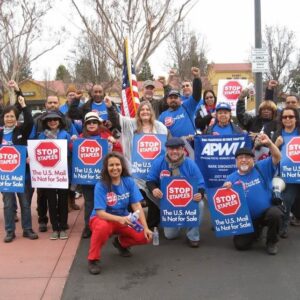August 10, 2012
Arbitrator Rules on Protection Against Layoffs
Arbitrator Stephen B. Goldberg ruled on Aug. 1 that employees represented by the APWU who transfer to or are excessed into non-APWU crafts may not carry the protection against layoffs they have earned under the APWU Collective Bargaining Agreement to their new crafts. Career employees in all crafts currently earn lifetime protection against layoffs after six years of “continuous service,” but all career employees represented by the APWU enjoy protection against layoffs, regardless of their length of service — provided they were on the rolls as of Nov. 21, 2010.
The dispute arose after the APWU and USPS concluded negotiations on the 2006-2010 Collective Bargaining Agreement, which included a Memorandum of Understanding (MOU) that extended protection against layoffs to regular workforce employees — including those with less than six continuous years of service — provided they were on the rolls as of Nov. 20, 2006. The APWU negotiated a similar MOU during bargaining for the 2010-2015 contract, extending protection for the life of the contract to career employees who were on the rolls as of Nov. 21, 2010.
In the case before Arbitrator Goldberg, the APWU argued that the APWU’s protections should continue to apply to APWU-represented employees if they are reassigned to the Letter Carrier or Mail Handler Crafts.
Although the NALC and NPMHU contracts include lifetime protection against layoffs after six continuous years of service, they do not include MOUs covering those with less than six years. The National Association of Letter Carriers (NALC) and the National Postal Mail Handler Union (NPMHU) began contract negotiations one year after the APWU and sought to extend protection against layoffs for the employees they represent, but have so far been unable to reach agreement with the USPS.
Arbitrator Goldberg concluded that if these other unions achieve the same protections as the APWU, employees who transfer or are excessed into the NALC or NPMHU crafts “would be protected from layoff under one MOU or another, and it would make no practical difference which MOU provided that protection.”
Goldberg also ruled that, “The general rule that an employee’s rights under a collective bargaining contract do not travel with the employee if he/she moves to a different bargaining unit covered by a different contract can be overridden by an employer and union who wish to negotiate rights that will continue in effect after the employee has left the bargaining unit. There is, however, the practical problem that it may be difficult or impossible for an employer to comply with a commitment to provide enforceable rights to an employee entering another bargaining unit with which the employer has a collective bargaining contract without either violating the contract rights of employees in the transferee unit or being forced to engage in unproductive conduct in order to comply with its commitments under both contracts.”
“We knew this case would be difficult,” said Mike Morris, director of Industrial Relations, “but we thought it was worth a try. Most importantly, APWU employees will now know exactly where they stand when choosing to transfer to or accept an assignment in another craft while being excessed.”


